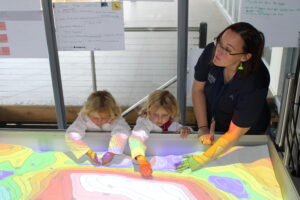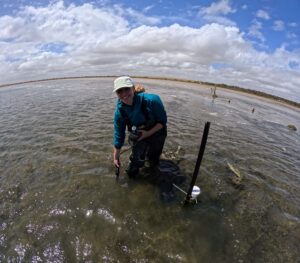Five teams of researchers, brought together through the Goyder Institute, have been conducting extensive investigations about the Coorong ecosystem that are critical to efforts to restore this iconic wetland. The research project is due to be completed in June 2022.

The Healthy Coorong Healthy Basin (HCHB) program is a $77.78 million initiative of the Australian and South Australian governments. The HCHB aims to support the long-term health of the Coorong by providing evidence-based solutions to both immediate threats and future conditions anticipated under a changing climate. The Goyder Institute has a major role in delivering the Scientific Trials and Investigations Project which will provide the evidence-base for more efficient and effective use of water to protect the ecological character of the Coorong and will inform the development of long-term management solutions.
In collaboration with its research partners and the Department for Environment and Water (DEW), the Goyder Institute is delivering five components of the science program. The researchers are engaging with other components of the Scientific Trials and Investigations Project, such as science integration and citizen science – for example, a number of scientists participated in the DEW-led Coorong Bioblitz event on 22 May 2021. The research is also supporting other HCHB projects (such as On Ground Works and the Coorong Infrastructure Investigations Project).
Initial project outputs are available here and some of the highlights of the work completed to-date are listed below:
Component 1: Understanding Coorong nutrient dynamics (DEW webpage) :
[Improving our knowledge on nutrient cycling, how to maximise nutrient turnover into productive elements such as plants, invertebrates, fish and birds and incorporating knowledge into a management response strategy]
- Detailed water quality and nutrient source (e.g. sediments) and process measurements have been undertaken since February 2020 during four seasonal field trips involving over 14 researchers from 7 research organisations, and specialist laboratory analyses (e.g. strontium isotopes). It has found:
- The bulk sediment is in poor health (high in organic carbon, nitrogen, phosphorus and anoxic/sulfidic, no benthic macroinvertebrates) in the South Lagoon and southern region of the North Lagoon.
- There are approximately 50 times more nutrients in the top 5 cm of sediment compared to the whole water column in the Coorong Lagoon.
- There is evidence of improved sediment quality and nutrient cycling where the aquatic plant Ruppia is present in the South Lagoon, and where macroinvertebrates are present in the North Lagoon.
- The findings are reducing key uncertainties on sources and transport so that the Coorong biogeochemical model being developed in the science integration component can be used to more confidently assess scenarios to achieve a “regime shift” back towards an aquatic plant dominated ecosystem, rather than the current algal dominated ecosystem.
Component 2: Restoring aquatic plants and removing algal blooms (DEW webpage):
[Undertaking research and trials to shift the system from being dominated by algae to being dominated by aquatic plants]
- Two large-scale surveys (October 2020 and March 2021) at roughly 100 sites throughout the central and southern Coorong have been undertaken to evaluate the distribution and abundance of the Ruppia aquatic plant community.
- More detailed sampling of six selected sites has been undertaken to generate a data set for use in modelling of a Ruppia Habitat Suitability Index (HSI) which will improve estimates of the suitability of habitat for the growth of the Ruppia community across the Coorong.
- There was no significant algal bloom in the 2020-21 season in the Coorong as observed in previous years, likely due to La Niña conditions, higher-than-average water levels and a lower mean summer temperature. Therefore, investigations and experiments relating to the factors affecting growth of filamentous algae will be conducted in-situ in the coming season (approximately July 2021 -January 2022), in addition to ex-situ (laboratory) experiments associated with modelling and restoration.
Component 3: Restoring a functioning Coorong foodweb (DEW webpage):
[Developing an integrated, quantitative food web model for the Coorong that can assess food web responses to various conditions based on investigations of the food resources and conditions required to increase food resource availability and energy supply for key biota (waterbirds and fish)]
- Field surveys to sample fish, macroinvertebrates, and zooplankton have been conducted throughout the Coorong in the South Lagoon, North Lagoon and Murray Estuary. Surveys commenced in February/March 2020, and were conducted once per season for fish and zooplankton, and monthly for macroinvertebrates to assess annual productivity. Samples were analysed for diversity, abundance, distribution and biomass, and energy content was measured with a calorimeter. The survey showed:
- Salinity levels in the Coorong South Lagoon remain above the tolerance levels of most of the Coorong macroinvertebrate community, and this is reflected in the low number of macroinvertebrate species currently present in the South Lagoon.
- Only one fish species, the smallmouth hardyhead, is currently present in the South Lagoon, and salinity levels are approaching its upper tolerance levels.
- Data on the diet composition of key biota in the Coorong has been collated and identified data gaps filled through additional measurements. This information is being used to develop an integrated quantitative food web model for the Coorong ecosystem.
Component 4: Improving habitat for waterbirds (DEW webpage):
[Protecting and increasing waterbird populations by creating nurseries for aquatic plants within the South Lagoon and increasing habitat and food resources in the broader landscape]
- In order to make quantitative predictions of the response of key waterbird species under different management scenarios in the Coorong South Lagoon, the project has been developing habitat suitability models based on the hydrological variables (water level and salinity) and these that will be made available for the main HCHB Coorong Infrastructure Investigations Project.
- The research team are looking to extend this modelling approach to four priority wetlands (Tolderol, Teringie, Waltowa, Lake Hawdon North) that form part of the broader landscape that supports the waterbird populations of the Coorong.
- Detailed information is being collected on habitat quality of the Coorong for the waterbird assemblage it supports. A global review of waterbird habitat quality metrics has been completed and two field trips have been undertaken at 8 sites (waterbird surveys, camera traps, benthic sampling, behavioural observations, body condition scoring) followed by processing and interpretation of information collected.
- An extensive bird-tracking program has been initiated using GPS tracking to collect information about the spatial ecology of key migratory and non-migratory waterbird species including sharp-tailed sandpipers, red-necked avocets, and pelicans.
Component 6: Climate change adaptation (DEW webpage):
[Undertaking a climate change vulnerability assessment of the Coorong and implementing climate adaptation activities for the region]
- There are four project phases taking place over a two-year period which are designed to build the understanding and capacity of decision makers and other stakeholders, and the first of these phases, context setting, is now complete.
- This phase has synthesised the long history of environmental and social changes in the Coorong, reviewed anticipated long-term environmental and ecological impacts of climate change, clarified the range of current management and research activities, and how they can be expected to lead to behavioural and physical changes that contribute to the current objectives for the Coorong (using ‘Theory of Change’), and explored the sensitivity of current activities and objectives to climate change.
For more information, contact the Goyder HCHB Research Program Manager, Dr Alec Rolston.
This project is part of the South Australian Government’s Healthy Coorong, Healthy Basin Program, which is jointly funded by the Australian and South Australian governments.



